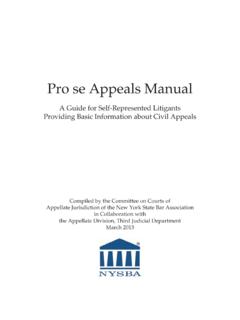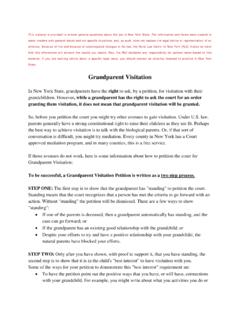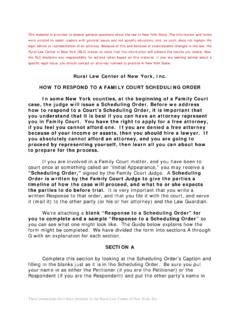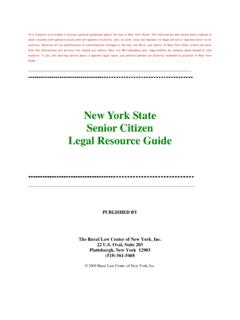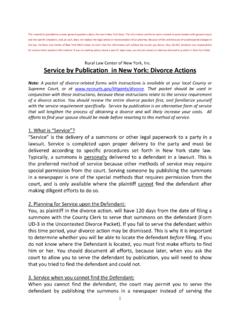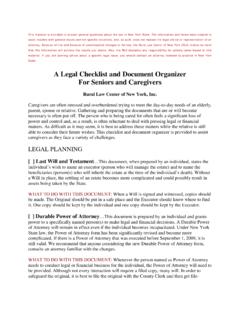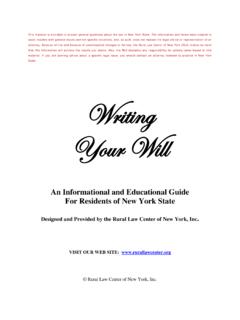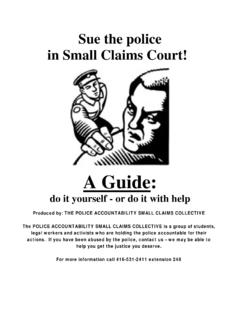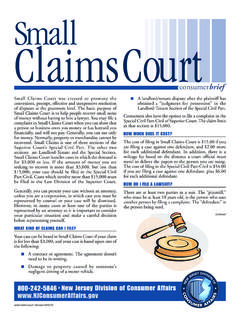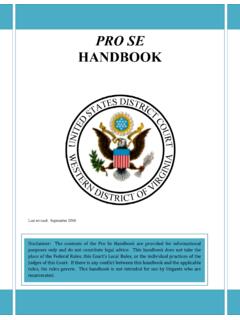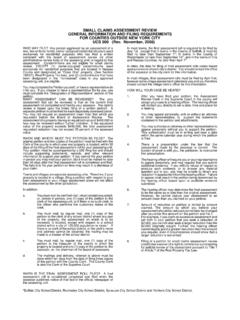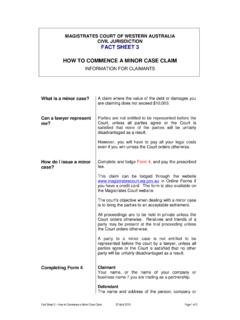Transcription of GUIDE TO SMALL CLAIMS COURT - Rural Law …
1 This material is provided to answer general questions about the law in New York State. The information and forms were created to assist readers with general issues and not specific situations, and, as such, does not replace the legal advice or representation of an attorney. Because of this and because of unanticipated changes in the law, the Rural Law Center of New York (RLC) makes no claim that this information will achieve the results you desire. Also, the RLC disclaims any responsibility for actions taken based on this material. If you are seeking advice about a specific legal issue, you should contact an attorney licensed to practice in New York State. GUIDE TO SMALL CLAIMS COURT The Rural Law Center of New York, Inc.
2 1. What is SMALL CLAIMS COURT ? SMALL CLAIMS Courts are courts that have been simplified and are less formal in order to allow greater access for parties in certain types of cases. All SMALL CLAIMS cases are civil (not criminal) and the issue at hand must be money owed. The limit on CLAIMS in SMALL CLAIMS Courts in New York State is $5000 in City Courts and $3000 in Town and Village Courts. 2. Who can use the SMALL CLAIMS Courts? A party must be an individual, aged 18 or over to bring a suit in SMALL CLAIMS Courts. If you are the person bringing the suit, you are called the Claimant . If you are the person being sued, you are called the Defendant . 3. Where are the Courts?
3 There are SMALL CLAIMS Courts throughout New York State. In metropolitan areas, SMALL CLAIMS cases are often part of the city COURT systems. In Rural areas, SMALL CLAIMS cases may be brought in any of the Town and Village justice courts. 4. Which COURT can I use? You are expected to file a SMALL CLAIMS case with a COURT where the defendant lives, or, in the case of a traffic accident, where the accident occurred. If your case is against a landlord or a business, you can file with the COURT where the rental property or business is located. 5. What is a typical SMALL CLAIMS dispute? SMALL CLAIMS disputes are over money that is alleged to be owed by one party to another. Usually, they are between individuals, and typical cases include debt collection, unpaid rent, breach of contract, damage to premises, bad checks and security deposits.
4 6. Do I need an attorney? It is not necessary, nor is it expected, that you will have an attorney represent you in a SMALL CLAIMS case. However, if you appear alone, it is important that you well prepared. In cases where CLAIMS are brought by landlords or businesses, often attorneys will be present to represent them. 7. What should I know before I file? Before you file a SMALL CLAIMS case, it is a good idea to assess your situation. You will have to invest time and some money in bringing your case. If the amount of money owed is very SMALL , it may not be worth your efforts. However, if you have decided that it is worth your while to proceed, it is important that you are prepared before you file.
5 You will be expected to prove your case and demonstrate exactly how much money is owed to you and for what reason. Be sure that you have all of the necessary documents: copies of contracts, promissory notes, checks, receipts, evidence of workmanship, etc. The more prepared you are, the easier it will be for you to file a claim . 8. How do I file? You must get an application form from the COURT and fill it out. The form will ask a number of questions. Be sure that you have complete information before you return the form to the COURT . You must be able to provide the full name and a street address (not a box) for the party you are suing. If you are suing a business you can get the legal name of the business from your local County Clerk.
6 Be absolutely certain that you are suing the right person. For example, if you sue the property manager of your apartment house instead of the owner and you win, your judgment may be worthless. Your application will also ask you for the amount of money you are suing for and a description of the reason you are suing the Defendant. Try to be concise in your statement, but be sure to provide enough information. It is not enough to say, He owes me money . 9. Is there a fee? There is a SMALL filing fee for SMALL CLAIMS cases. As of this writing, the fees in City Courts are $ for CLAIMS up to $1000, and $ for CLAIMS up to $5000. The filing fees in Town and Village Courts are $ for CLAIMS up to $1000, and $ for CLAIMS up to $3000.
7 10. What happens next? When you give your paperwork to the COURT , the COURT Clerk will select a date on the COURT calendar for your case to be heard. Then, the clerk will serve the Defendant with a notice of your claim , by mailing to the address you provided. The notice is sent by certified mail and by ordinary first class mail. If the first class mailing is not returned to the COURT as undeliverable, then the Defendant is assumed to have received it. If the Defendant cannot receive the notice by mail, the COURT clerk can tell you how to proceed next. However, your case cannot continue until the Defendant has been served. 11. What is a Counterclaim? If the person you are suing believes that he or she has a monetary claim against you, then he or she may file a counterclaim.
8 Like your claim , the Defendant s counterclaim must state an amount of money and the explanation for the money presumed owed. A counterclaim may be filed for a SMALL fee and the COURT will give you notice of the filing. If the Defendant in your case has filed a counterclaim, you should be prepared to deal with that case, as well as your own. 12. Can my case be settled before I see the judge? Yes, in fact in most SMALL CLAIMS Courts, the parties are encouraged to participate in dispute resolution services prior to their COURT appearance, by participating in mediation. These mediation services are made available to the courts by the local Community Dispute Resolution Centers (CDRC s).
9 There is a CDRC in every county in New York State, and mediation services are provided to courts and communities by trained and certified mediators. Mediation has proven to be extremely successful in SMALL CLAIMS cases, since the process allows both parties to work out a satisfactory solution to their dispute. 13. How does Mediation work? Mediation is an opportunity for the parties to meet with a neutral, third party (the mediator) and attempt to reach a solution to the dispute that is acceptable to both parties. Participation in mediation is voluntary and mediation discussions remain confidential. This gives the parties an opportunity to discuss the case freely in the hopes of working things out.
10 The judge does not participate in mediations, nor does the mediator provide the COURT with a report of the discussion. If the mediation results in a signed agreement, only the actual agreement is provided to the COURT . 14. Why would I want to mediate my case? Even if you think you have a strong case, there is no guarantee of how the judge will rule. There may be evidence presented by the other party that convinces the judge to rule against you. And, when the judge rules, there is always one winner and one loser. In mediations, generally the parties reach a mutually acceptable compromise. This is certainly preferable to taking a chance on the judge s decision. A mediated settlement will give you at least a partial win, as opposed to a possible complete loss.
